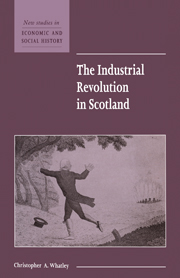Book contents
- Frontmatter
- Contents
- Acknowledgements
- Map of Scotland
- Introduction
- 1 Identifying Scotland's Industrial Revolution (1): the pre-Union inheritance
- 2 Identifying Scotland's Industrial Revolution (2): Union to c.1850
- 3 Causes
- 4 Social aspects of the Scottish Industrial Revolution
- References
- Index
- New Studies in Economic and Social History
2 - Identifying Scotland's Industrial Revolution (2): Union to c.1850
Published online by Cambridge University Press: 12 October 2018
- Frontmatter
- Contents
- Acknowledgements
- Map of Scotland
- Introduction
- 1 Identifying Scotland's Industrial Revolution (1): the pre-Union inheritance
- 2 Identifying Scotland's Industrial Revolution (2): Union to c.1850
- 3 Causes
- 4 Social aspects of the Scottish Industrial Revolution
- References
- Index
- New Studies in Economic and Social History
Summary
Although the immediate post-Union decades are something of a dark age in Scottish economic historiography, in Scotland there is less evidence of the general buoyancy which has been identified in the English economy over the period c.1685-1725 [293]. In some sectors of the domestic manufacturing economy the incorporating union was clearly damaging. Even though there were some shortterm benefits which included soaring grain exports and a rise in the numbers of black cattle crossing the border, the failure of 1707 to bring sustained and widespread rewards forced even (hesitant) pro-Union contemporaries such as Sir John Clerk of Penicuik to concede that in most respects the Scottish economy c.1730 was much as it had been thirty years earlier [297].
Far too much emphasis however can be placed on 1707 as a turning point in Scottish economic history. Clearly it had an effect, but on its own it did not mark a substantial change in either the direction or the pace of Scottish economic life. The trends established earlier in the previous century were maintained, if uncertainly prior to the 1720s, as the Scots assessed and began to adjust to the new market situation. This was one of risks as well as opportunities within the British mercantilist framework [74:28-9].
Colonial links strengthened while modest improvement in the performance of the critical agrarian sector may be indicated by its capacity to feed the Lowland population - even during the crisis years of 1740-41. Although other important ameliorating factors played their part agrarian reform was occurring in the south-east Lowlands in particular. This took the form of more common use of longer, written leases, the strong but variable and incomplete move towards the payment of rents in money and consequent commercialisation of rural society, and a radical reduction in multiple tenancies [82]. Continuity as well as readjustment can be seen in the founding in 1723 of the Honourable Society of Improvers in Agriculture. In part this also represented the growing and widespread patriotic concern there was in influential circles about the condition of the Scottish economy in general and the linen, fishing and woollen industries in particular. This led in 1727 to the establishment of the Board of Trustees for Improving Fisheries and Manufactures, a body charged with the responsibility of raising the quality and output of these Scottish products [30:51].
- Type
- Chapter
- Information
- The Industrial Revolution in Scotland , pp. 18 - 37Publisher: Cambridge University PressPrint publication year: 1997



